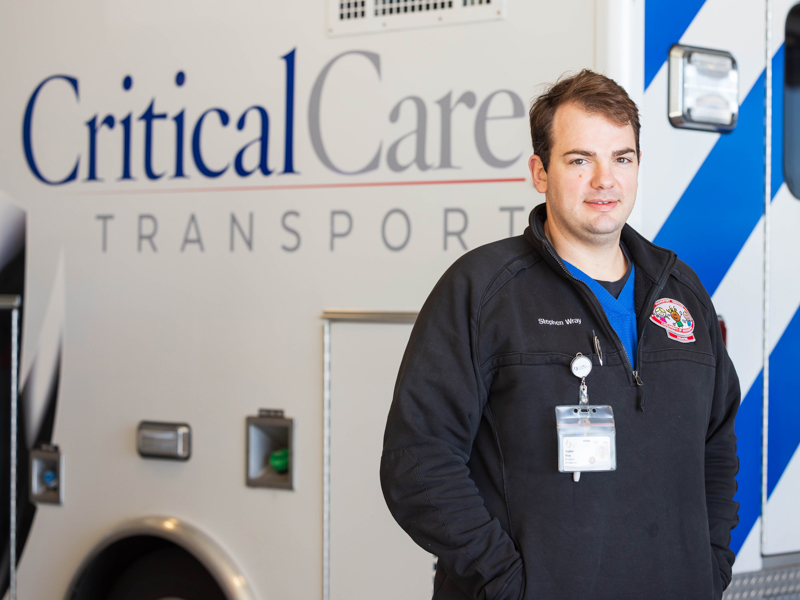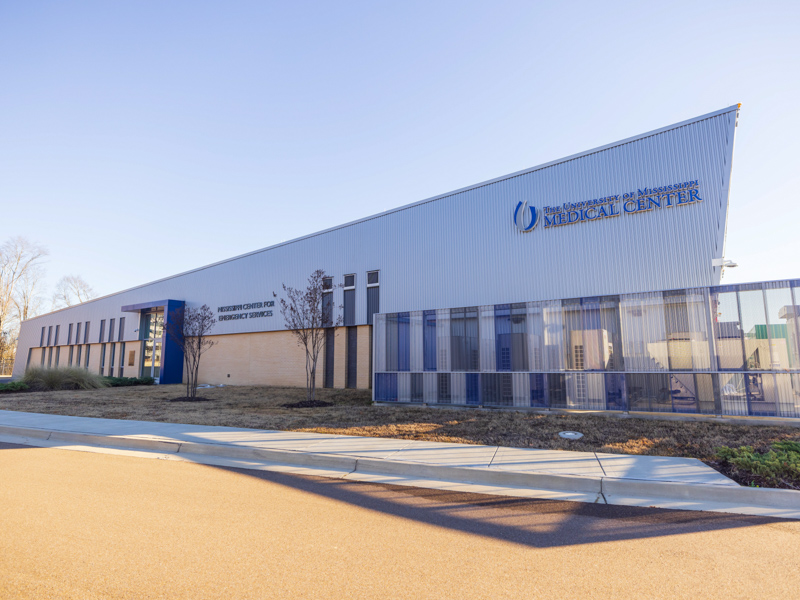Front and Center: Stephen Wray

When a critically ill child in Mississippi needs the resources of the state’s only academic medical center for the best chance of survival, Stephen Wray might be the nurse providing both the care and the connection.
As a University of Mississippi Medical Center pediatric critical care transport nurse, Wray and his team at UMMC’s Mississippi Center for Emergency Services take a highly specialized ambulance to communities statewide, picking up critically sick or injured children and transporting them to Children’s of Mississippi for lifesaving care, be that immediate surgery for traumatic injuries or treatment in the pediatric Emergency Department, intensive care unit or Batson Tower.
“Ninety-nine percent of the patients we transport come back to UMMC, because we’re the only big pediatric center for the state,” said Wray, a registered nurse in the Children’s of Mississippi PICU before transitioning to MCES pediatric transport. Established in 2010, it’s the only dedicated pediatric transport team in Mississippi providing hospital-to-hospital transportation for critically ill children.

MCES houses one pediatric critical care ambulance and one neonatal critical care ambulance, with two backup ambulances if needed. Two clinicians travel with each ambulance on runs that can happen 24/7.
“We transport the sickest of the sick if they’re critical,” Wray said. “If someone has a broken leg, they can be transported by a local ambulance. When a child might need critical care intervention is when we are called in.”
It’s the specialized care given by Wray and other critical care transport nurses and paramedics that can make all the difference when minutes and seconds count. “We sometimes meet local emergency medical responders at a halfway point because the patient’s injuries are so time-sensitive, and so that we can get them stabilized,” Wray said.
“We have more pediatric equipment and medicines in our ambulance than most rural hospitals have, especially for airway interventions,” Wray said. “Every transport we go on, we bring blood. A lot of ambulance services can’t do that.
“You get into situations where you don’t know on the front end the extent of all of the injuries, and there’s always the possibility that you will get redirected to pick up a more severely injured or sick patient.”
Although most patients are transported to UMMC from the hospital where they were first treated, a hospital is sometimes chosen for the halfway meeting point. The transport team can also treat the patient in a hospital’s emergency room before loading them for the ride to Jackson.
The team completes about 45 transports a month. “If we get a call to go to Starkville, it will be about six hours from the time we leave to the time we get back,” Wray said. “Two of those trips in a day makes for a pretty long day.”
Wray is a valuable team member whose nursing skills translate well into emergency transport, and he always puts his patients first, said Stephen Houck, MCES director.

“Stephen brings a wealth of experience to the team from his time in the PICU managing complex cardiac patients,” Houck said. “His easy-going personality, flexible mindset and great bedside manner make him a perfect clinician for the pre-hospital/transport environment and one that everyone enjoys working with.”
Much of the trauma Wray and his team treat is typical for a rural state. “We see a lot of ATV accidents where the patient is not restrained or wasn’t wearing a seat belt. Rarely does someone wear a helmet on an ATV,” Wray said. “We see young teenagers with gunshot wounds.
“One of the frustrating things we see is the families and patients that have such a lack of resources to keep up with whatever disease or injury they are dealing with,” he said. “Depending on where they might live in the Delta, a hospital might be an hour or an hour and a half away. By the time we get there, they might have been sick for several hours.
“We are trying to catch up and might be way behind the eight ball in moving the patient in the right direction.”
It’s his job, Wray said, to get his patient on the other side of the eight ball. And although not all patients can have a good outcome, many lives are saved because of the expert care given.
“We transported a child who had been shot in the abdominal region,” Wray said. “We met the local EMS halfway, and the patient was in shock from loss of blood. We were able to give him blood, medicines to keep his blood pressure up, and medicines to help him to stop bleeding until we could get him to the OR.
“That patient had surgery, recovered in the PICU, went to the floor and then came home.”
Wray earned his bachelor’s degree in kinesiology from Mississippi State University and completed his nursing education at Holmes Community College, later earning certification in critical care nursing. Wray and wife Regan live in Jackson and dote on their “spoiled rotten mutt” named Breck.
When he’s not working, he likes to hunt and run. “I just got finished running the U.S. Marine Corps Marathon in November in Washington, D.C.,” Wray said. “I did good. I finished, and that was the goal for 26.2 miles.”
What he likes best about being a pediatric transport nurse, Wray said, is bringing care to those who need it most.
“It’s being able to go out to these outside facilities that don’t have the resources, and provide those resources and see the patient’s condition improve,” he said. “And then, to continue their treatment at UMMC and hopefully get them home to live a normal life.”
Read more Front and Center stories online. Do you know a student, staff, volunteer or faculty member at the University of Mississippi Medical Center whose story would make an interesting feature or deserves to be recognized? Think about someone with outstanding job commitment, fascinating hobby or amazing accomplishment.
To nominate someone to be considered for a Front and Center feature, just complete and submit this short form. If that person is picked for a feature, a member of the Communications and Marketing staff will contact him or her to learn more about his or her personal story.


